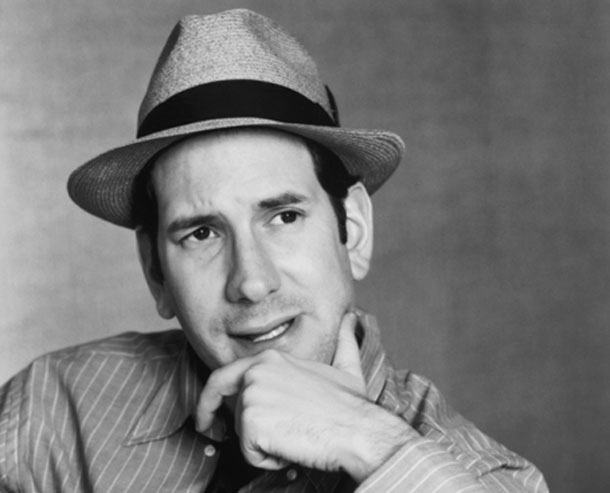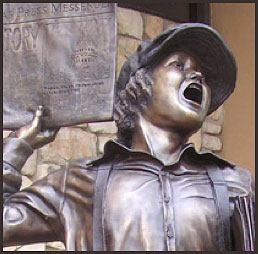
THUNDER BAY – An E-volution was marked this past weekend. The Drudge Report, an American website celebrated its 15th birthday. Matt Drudge is one of the individuals who has changed journalism and likely changed it for the better. Drudge’s leap to ‘fame’ if that is what one might call it came during the presidency of Bill Clinton. Drudge broke the story of a previously unknown intern, Monica Lewisky.
The Drudge Report Changed Journalism
Was he popular? No. Matt Drudge with his then leading edge 486 computer and a modem was threatening the establishment. The traditional media was upset by that and came out against him.
In a speech 15 years ago to the Washington Press Club, Matt Drudge told them what it was like: ” ‘He’s one man out of control,’ a caller warned on talk radio in Los Angeles. ‘There is such a built-in level of irresponsibility in everything he does,’ cried First Amendment protector Floyd Abrams in a page one Wall Street Journal piece. ‘The notion of a Matt Drudge cyber gossip sitting next to William Safire on Meet the Press would have been unthinkable,’ smacked Watergate’s Carl Bernstein in an op-ed.”
New ideas, especially new ideas that threaten long established power bases are rarely popular – with the long established power bases.
However Matt Drudge grew popular where it counts – his readers.
Viva the E-volution
For journalists, the old adage of having a ‘scoop’ and being the first to report something that would shake the foundations has, in many cases been replaced in most media outlets with political correctness, and then with demands from the advertising department and the finance department.

Many aspiring journalists looked, in the 1970s to the Washington Post and reporters Carl Bernstein and Bob Woodward. Almost single-handedly those reporters covering the Watergate Scandal brought down President Richard Nixon. Today almost anytime there is a political scandal the ‘Gate’ is applied to it by pundits and the media.
However over time, as always things changed.
Drudge took that traditional model, turned it on its ear and put a whole new spin on how reporting could be done.
Today, the media, often to the chagrin of the establishment is open to all. Youtube is your broadcast network, Facebook is your distribution channel, and Twitter is your newsboy on the street yelling ‘Extra extra, read all about it’.
The Facebook share has become like the ‘Billions and billions served’ on the sign outside of almost every McDonalds Restaurant.
Journalism and society continues to be changed by how technology and the marketplace drives news and information.
We should all be celebrating with the Drudge Report, and the Canadian version, Pierre Bourque’s Bourque Newswatch, It was in their models that the formula for NetNewsLedger was born. Our Thunder Bay based version combines news, information and sass under the model of ‘News at the Speed of the Internet’©.
We may not scoop everyone all the time, but we strive for speed combined with accuracy.
That path forward has been blazed by the work of Matt Drudge, and Pierre Bourque. It has been supported by the marketplace.
Let the E-volution continue!
James Murray
Matt Drudge at Washington Press Club June 2 1998
MR. DRUDGE: Applause for Matt Drudge in Washington at the Press Club, now there’s a scandal. (Laughter.) The kind of thing I’d have a headline for.
I’d like to thank the president of the Press Club, Doug Harbrecht, thank you very much, for extending the invitation to address you today, and to Kerry Gildae, the brave member of the Speakers Committee, for suggesting it. Thank you very much.
You know, last time I was in town—and this is my hometown, Washington, I grew up here—I arrived to a headline in the local paper, “I was baby-sat by Matt Drudge—Exclusive!” (Laughter.)
They quoted one of my elementary-school chums: “Even at age 12, Drudge already liked to tell stories. He’d take all the kids down to a creek behind my house when it was dark and tell us those elaborate stories. We’d be terrified.”
Well, the one thing that has changed is my shoe size. (Laughter.).
You know, and what a place, Washington, DC, to grow up in. I used to walk these streets as an aimless teen, young adult, walk by ABC News over on DeSales, daydream; stare up at the Washington Post newsroom over on 15th Street, look up longingly, knowing I’d never get in—didn’t go to the right schools, never enjoyed any school, as a matter of fact, didn’t come from a well-known family—nor was I even remotely connected to a powerful publishing dynasty.
Burning(?) I may have been, but I was sophisticated enough to know I would never be granted any access, obtain any credentials, get that meeting with Vernon Jordan or work with Newsweek magazine. There wasn’t a likelihood for upward mobility in my swing-shift position at 7-11. (Laughter.) That was my last job in Washington.
So, in the famous words of another newsman, Horace Greeley, I, still a young man, went West, out to Hollywood. And I do mean Hollywood, not Beverly Hills, not the Palisades, no 90210 for this kid. It was the part of Hollywood they always promised to clean up and they never do, a part of Hollywood you see on Cops. (Laughter.) Where you twinkle and then wrinkle and people forget about you. That’s where I’m from.
I swung into another clerk job, this time at CBS. I folded T-shirts in the gift shop, dusted off 60 Minutes mugs. Occasionally after hours I had conversations with those ghost of Bill Paley. It was during one of these wee-hour chats that he reminded me the first step in good reporting is good snooping.
Inspired, I went out of my way to service the executive suites. I remember I delivered sweatshirts to Jeff Sagansky, at the time president of CBS.
Overhearing, listening to careful conversations, intercepting the occasional memo, I would volunteer in the mail room from time to time. I hit pay dirt when I discovered that the trash cans in the Xerox room at Television City were stuffed each morning with overnight Neilsen ratings, information gold. I don’t know what I did with it; I guess we, me and my friends knew Dallas had got a 35-share overFalcon Crest, but we thought we were plugged in.
I was on the move—at least I thought so. But my father worried I was in a giant stall. And in a parental panic he overcame his fear of flying and dropped in for a visit. At the end of his stay, during the drive to the airport, sensing some action was called for, he dragged me into a blown-out strip on Sunset Boulevard and found a Circuit City store. “Come on,” he said desperately, “I’m getting you a computer.” “Oh, yeah, and what am I doing to do with that?” I laughed.
And as they say at CBS studies: Cut, two months later. Having found a way to post things on the Internet—it was a quick learn—Internet news groups were very good to me early on—I moved on to scoops from the sound stages I had heard, Jerry Seinfeld asking for a million dollars an episode, to scoop after scoop of political things I had heard from some friends back here.
I collected a few E-mail addresses of interest. People had suggested I start a mailing list, so I collected the E-mails and set up a list called “The Drudge Report.” One reader turned into five, then turned into 100. And faster than you could say “I never had sex with that woman” it was 1,000—(laughter)—5,000, 100,000 people. The ensuing website practically launched itself.
Last month I had 6 million visitors, and I currently have a daily average larger than the weekly newsstand sales of Time magazine. Thank you, Sidney Blumenthal. (Laughter.)
What’s going on here? Well, clearly there is a hunger for unedited information, absent corporate considerations. As the first guy who has made a name for himself on the Internet, I’ve been invited to more and more high-toned gatherings such as this, the last being a conference on Internet and society and some word I couldn’t pronounce, up at Harvard a week ago.
And I mention this not just to blow my own horn, but to make a point. Exalted minds—the panelists’ and the audience’s average IQ exceeds the Dow Jones—didn’t appear to have a clue what this Internet’s going to do; what we’re going to make of it, what we’re going to—what this is all going to turn into. But I have glimpses. And sometimes deep in the middle of the night I tell them to Bill Paley.
We have entered an era vibrating with the din of small voices. Every citizen can be a reporter, can take on the powers that be. The difference between the Internet, television and radio, magazines, newspapers is the two-way communication. The Net gives as much voice to a 13-year-old computer geek like me as to a CEO or speaker of the House. We all become equal.
And you would be amazed what the ordinary guy knows.
From a little corner in my Hollywood apartment, in the company of nothing more than my 486 computer and my six-toed cat, I have consistently been able to break big stories, thanks to this network of ordinary guys. The Drudge Report, first to the name the vice-presidential nominee on the Republican ticket last election; first to announce to an American audience that Princess Diana had tragically died; first to tell the sad, sad story of Kathleen Willey, first every weekend with box-office results that even studio executives, some of them, admit they get from me. A new cable network is forming. I was first to announce the unholy alliance between Microsoft and NBC.
I’ve written thousands of stories, started hundreds of news cycles. My readers can follow earthquakes, weather patterns, read Frank Rich on Saturday, Maureen Dowd on Sunday, from my site link to Bob Novak on Monday; dozens of other media spectrums, from Molly Ivens; track the world’s news wires minute to minute.
And this is something new. This marks the first time that an individual has access to the news wires outside of the newsroom. You get to read all the news from the Associated Press, UPI, Reuters, to the more arcane Agence France Presse and the Xinhua. I’m a personal fan of the Xinhua Press.
And time was only newsrooms had access to the full pictures of the day’s events, but now any citizen does. We get to see the kinds of cuts that are made for all kinds of reasons; endless layers of editors with endless agendas changing bits and pieces, so by the time the newspaper hits your welcome mat, it had no meaning.
Now, with a modem, anyone can follow the world and report on the world—no middle man, no big brother. And I guess this changes everything. It certainly changed on the night of January 17th, when Newsweek spiked, at the 11th hour, a well-researched, responsibly documented piece about the president of the United States and an obscure White House intern named Monica Lewinsky.
After checking with multiple sources, I ran a story about the killing of the story. According to the Los Angeles Times, people familiar with the matter said Clinton was informed Saturday night or Sunday morning The Drudge Report had posted that Lewinsky was about to erupt. For four days I had the story exclusively, and I took a lot of heat. Everyone was afraid of it until the water broke over at theWashington Post that Wednesday, and then everyone jumped on it.
Now they love it too much, and I’m still taking the heat. “He’s one man out of control,” a caller warned on talk radio in Los Angeles. “There is such a built-in level of irresponsibility in everything he does,” cried First Amendment protector Floyd Abrams in a page one Wall Street Journal piece. “The notion of a Matt Drudge cyber gossip sitting next to William Safire on Meet the Press would have been unthinkable,” smacked Watergate’s Carl Bernstein in an op-ed.
I was here last night looking over the Press Club, and I noticed a room dedicated to one of—someone I can relate to, John Peter Zenger. And there’s a plaque outside the room. And I think he could relate to some of the heat I’ve been getting. To honor members of the newspaper industry, this room commemorates the achievements of John Peter Zenger 250 years ago, whose courage in publishing political criticism helped establish the precedent of press freedom in colonial America.
He was born in Germany. Zenger was a publisher in 1734 when he was imprisoned on charges of criminal libel for articles in his newspaper criticizing the royal governor. Risking his business and possible life, Zenger stood fast and was acquitted in a jury trial after a brilliant defense of press liberty by his lawyer, at that time Andrew Hamilton.
It got me thinking that really what we’re looking at here is history repeating. When radio lost out to television, there was anxiety. The people in the radio industry were absolutely anxious and demanded government stop the upcoming television wave. Television was very nervous about other mediums coming forward; cable. The movies didn’t want sitcoms to be taped at movie studios for fear it would take away from the movies.
No, television saved the movies. The Internet is going to save the news business. I envision a future where there’ll be 300 million reporters, where anyone from anywhere can report for any reason. It’s freedom of participation absolutely realized.
The first lady of the United States recently addressed concerns about Internet during a cyberspatial Millennium Project press conference just weeks after Lewinsky broke. She said, “We’re all going to have to rethink how we deal with the Internet. As exciting as these new developments are, there are a number of serious issues without any kind of editing function or gatekeeping function.” I wonder who she was referring to.
Mrs. Clinton continued, “Any time an individual leaps so far ahead of that balance and throws the system, whatever it might be—political, economic, technological—out of balance, you’ve got a problem. It can lead to all kinds of bad outcomes which we have seen historically.”
Would she have said the same thing about Ben Franklin or Thomas Edison or Henry Ford or Einstein? They all leapt so far ahead out that they shook the balance. No, I say to these people, faster, not slower. Create. Let your mind flow. Let the imagination take over. And if technology has finally caught up with individual liberty, why would anyone who loves freedom want to rethink that?
And that’s why I’m addressing you today. It got me in the door, this new technology. You walk into the Press Club, you see a plaque dedicated to Joseph Pulitzer—someone, again, I love. Our republic and its press will rise or fall together. An able, disinterested, public-spirited press can preserve that public virtue without which popular government is a sham and a mockery. The power to mold the future of the republic will be in the hands of the journalists of the future generations. And if Pulitzer were alive today in this time, he would add using future media.
I was walking the streets of Washington, the streets I grew up in, last night. I found myself in front of the Washington Post building again, looking up, this time not longingly. This time I laughed. Let the future begin. (Applause.)









